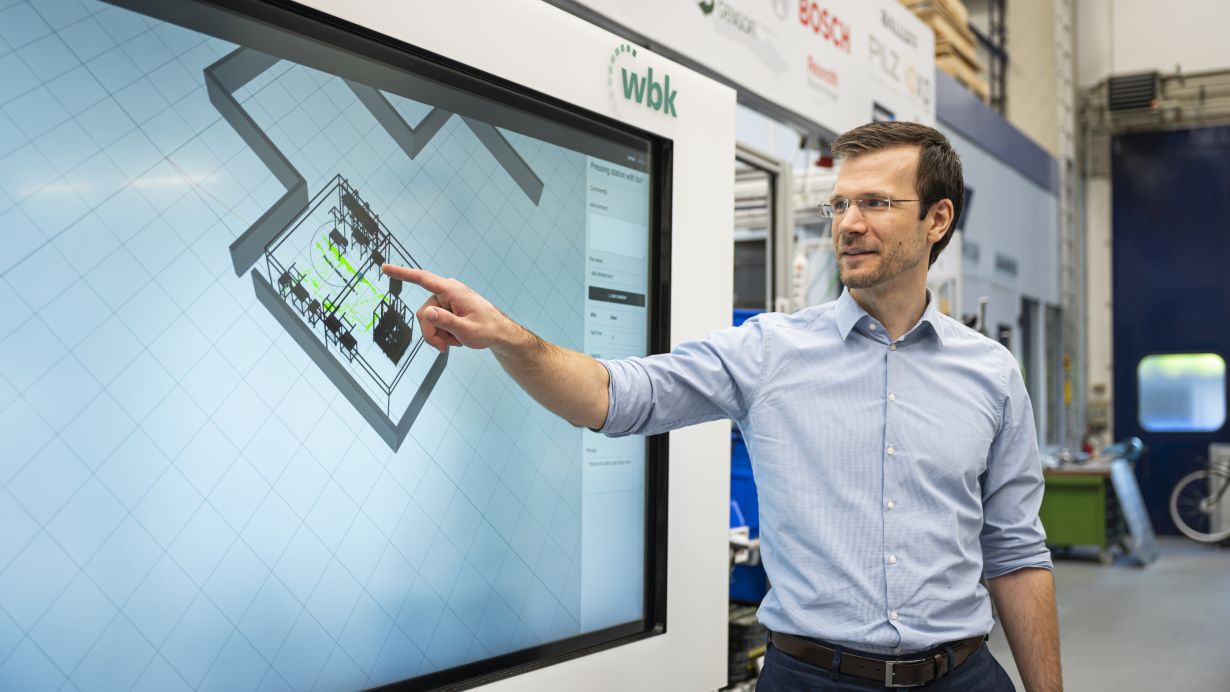Fluctuating demand, supply bottlenecks, individualized products: Being able to produce economically even in the face of dynamic changes poses challenges for the automotive industry and its suppliers. The project Software-defined Manufacturing for the Automotive and Supplier Industry (SDM4FZI) is developing solutions to ensure fast, flexible, and efficient production. The project involves a total of 30 companies, who have come together to pool their expertise, led by Bosch and with Karlsruhe Institute of Technology (KIT) and the University of Stuttgart as scientific partners. The German Federal Ministry for Economic Affairs is funding the project with a total of 35 million euros.
The goal of the SDM4FZI project is to decouple software and hardware to flexibly plan, control, and change everything from individual elements of production systems to entire factories. This should enable automobile manufacturers to switch more quickly between models and products and to produce a wider range of alternatives. The German Federal Ministry for Economic Affairs and Energy is funding the project with a total of around 35 million euros.
The basis for maximum adaptability is the complete separation of production system hardware and the controlling software. Software-defined manufacturing (SDM) works with digital twins, i.e. virtual images of the existing hardware, which can be used to automatically derive, test, and distribute the appropriate software. This saves development time, resources, energy, and costs.
Versatile Production through Software-defined Manufacturing
The software-defined manufacturing method used in SDM4FZI was developed by the Institute for Control Engineering of Machine Tools and Manufacturing Units (ISW) at the University of Stuttgart and Bosch. The project began with joint preliminary work and has now been initiated by the ISW and the wbk Institute of Production Science at KIT within the framework of the Innovation Campus “Future Mobility” (ICM).
The scientists at KIT focus on the design of software and hardware in modern, digitized production. "In particular, we are investigating how production versatility can be increased by a targeted decoupling of software and hardware, i.e., how this can be adapted to changing framework conditions," explains Professor Gisela Lanza from the wbk Institute of Production Science at KIT. Central to this is the virtual mapping of components and systems in production using so-called digital twins, and their interaction with digital images of products and technologies along the entire value chain. The wbk team is also investigating the extent to which quality control for complex manufacturing processes can be supported by the separation of software and hardware and the integration of functional models. In addition, the researchers at KIT are involved in the fields of robotics and handling at the Institute for Materials Handling and Logistics and at the Institute for Anthropomatics and Robotics - Intelligent Process Automation and Robotics, as well as in cloud integration and the connection to Gaia-X at the Institute of Applied Informatics and Formal Description Methods.
Production OT with Reference Architecture Model and Software-defined Manufacturing Capabilities
The University of Stuttgart, which is represented by a total of four institutes in the SDM4FZI project that are managed by the Institute for Control Engineering of Machine Tools and Manufacturing Units (ISW), focuses on the two SDM core technologies: The Reference Architecture Model and Production OT (Operational Technology). "Digital twins represent a key element of the SDM concept," explains the Head of the ISW, Professor Alexander Verl. "They describe products, processes, and production systems by means of data, information, and behavioral models that are developed throughout the entire machine or product life cycle."
A consistent blueprint (reference architecture) ensures interoperability across the entire supply chain. Production OT capable of SDM enables automatically generated software to be distributed to production systems interoperably and in real time. This requires entirely new infrastructure with open control architectures and continuous communication from sensor to cloud.
"The large number of project partners proves how important software is for the manufacturing of the future," emphasizes Michael Neubauer, scientific coordinator from the ISW at the University of Stuttgart. "We are working on pioneering approaches that improve the competitiveness of German companies." The solutions developed at the Arena 2036 research campus will be transferred from the institutes to the automotive and supplier industries.
Further information about the project SDM4FZI: https://www.sdm4fzi.de/en/
Further information (in German) about the Innovation Campus “Future Mobility”: http://www.icm-bw.de
In close partnership with society, KIT develops solutions for urgent challenges – from climate change, energy transition and sustainable use of natural resources to artificial intelligence, sovereignty and an aging population. As The University in the Helmholtz Association, KIT unites scientific excellence from insight to application-driven research under one roof – and is thus in a unique position to drive this transformation. As a University of Excellence, KIT offers its more than 10,000 employees and 22,800 students outstanding opportunities to shape a sustainable and resilient future. KIT – Science for Impact.

